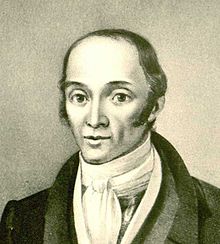Georgije Magarašević

Georgije Magarašević (Adaševci, 10 September 1793 – Novi Sad, 6 January 1830), Serbian writer, historian, editor and publisher, dramatist, translator and collector of folk proverbs. He belongs to the same generation of Serbian writers as Dimitrije Davidović, Teodor Pavlović, Danilo Medaković, all of whom expressed in some degree their indebtedness to Dositej Obradović and Vuk Karadžić.
Contents
1 Biography
2 Literary critic
3 Works
4 Founder of Serbski letopis
5 Death
6 References
7 Sources
Biography
He was born on 10 September 1793 in the Serbian village of Adaševci in Srem, in what was once the Serbian Military Frontier and today is Vojvodina, Serbia. He was educated in the Gymnasium and Theological College of Sremski Karlovci. He went to the university of Pest to study philosophy and natural sciences. In 1813, he became professor at Sremski Karlovci's Theological College and in 1817 professor of history, literature and philosophy at Novosadska Gimnazija (the Gymnasium of Novi Sad).
Literary critic
Magarašević was attracted to the study of the ancient and modern literature and history of his people, and in 1822 he published the firstfruits of his researches, under the title Nove istroiceske pamtivostonosti zivota Napoleona Bonaparta. He was the first to tackle the question of literary history in a more consistent manner than those before him. In his three letters about Serbian literature published in the "Serbski letopis" ("Serbian Annals"), Magarašević made a distinction between universal literary history, literary history of a certain epoch, and national literary history of the "fatherland".
Magarašević participated in the debate between the proponents of the vernacular and those of the Slavonic-Serbian language, and he considered Dositej Obradovic the first modern Serbian writer, though he also accepted some of Vuk Karadzic's ideas on the vernacular language "revolution" (then taking place).
According to Magarašević, national literature could not be written in a dead or artificial language, only in a living everyday one, because literature was the mirror of a nation, its culture, its literacy, and its character. Imitating old literary models could be rewarding and illuminating but could not match the original because it lacked a national context, language and subject.
Works
Magarašević's earlier works include "Nove istroiceske pamtivostonosti zivota Napoleona Bonaparta"(Buda, 1822); "Istorija najvazniu politićni evropeiski priklocenij ot Vienskog mira 1809 do 1821 godine" (Vienna, 1823); "Kratka vsemirna istorija" (Buda, 1831); "Putovanje po Srbiji" (1827); "Duh spisanija Dositejevi" (1830); "Dositejeva pisma" (1829); and "Iz arhipastorskog rada mitropolita Pavla Nenadovića", in Brankovo kolo, XXXV, reprinted in 1903.
Founder of Serbski letopis
Magarašević may not get the credit as the founder of Matica srpska, however, he was the spark that ignited others (Gavrilo Bozitovac, Jovan Demetrović, Josif Milovuk, Petar Rajić, Andrija Rozmirović, Djordje Stanković, Jovan Hadžić, its first president) to make it happen. In fact, he had lots of encouragement from Lukijan Mušicki and Pavel Jozef Šafárik, the director of the Gymnasium at Novi Sad, where Magarašević was professor.[1]
Matica srpska actually began in 1824 when the Austrian authorities permitted writer Georgije Magarašević, a professor at a gymnasium in Novi Sad, to publish a literary and scholarly journal entitled Serbski letopis (Serbian Annals). Magarašević had little financial backing but soon found benefactors who supported his efforts, and in time somehow the writers and editors of the publication developed into a learned society. The society successfully overcame the pressures applied by mistrustful Austrian officials as well as later financial difficulties. With varying degrees of success but with great perseverance, it has continued to support and guide Serb intellectual endeavour, first as a part of the Habsburg Empire and much later in Serbia.
Magarašević was the first to tackle the question of literary history in a more consistent way than anyone else before. In his three editorials about Serbian literature published in the Serbski letopis, Magarašević made a distinction between universal literary history, literary history of a certain epoch, and national literary history of the "fatherland".
Death
Georgije Magarašević died of consumption at Novi Sad on 6 January 1830. He was 35 years old.[citation needed]
| Wikimedia Commons has media related to Georgije Magarašević. |
References
^ History of the literary cultures of East-Central Europe Marcel Cornis-Pope, John Neubauer - 2004 Volume 3 - Page 41 9027234558 "In addition to books, it published the journal Serbski Letopis, founded two years earlier by Georgije Magarašević, Pavel Jozef Šafárik, and Lukijan Mušicki in Novi Sad, where Magarašević was professor and Šafárik the director of the Serbian gymnasium."
Sources
- Translated and adapted from Jovan Skerlić's Istorija nove srpske književnosti (Belgrade, 1921), pages 153-155
